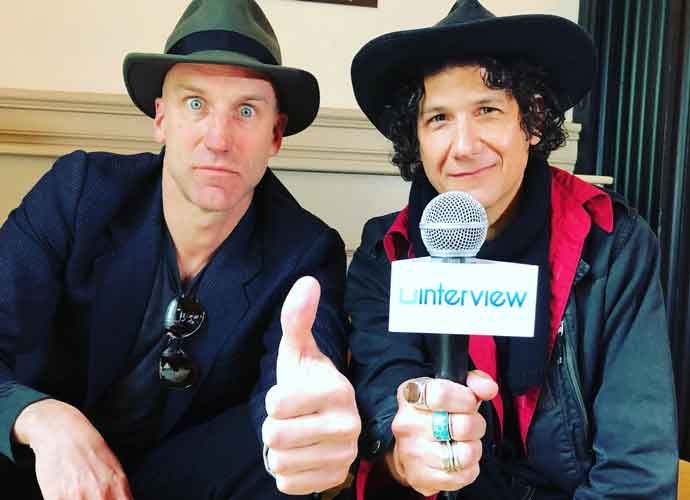VIDEO EXCLUSIVE: Christopher Thorn & Roger Stevens On ‘All I Can Say,’ Part 3 – Shannon Hoon’s Death, Drug Addiction
Blind Melon’s new documentary All I Can Say is a riveting look at the legendary rock band’s rise to fame and puts emphasis on its late bandmate Shannon Hoon, who died in 1995 of a cocaine overdose at age 28.
Christopher Thorn and Roger Stevens, two of Blind Melon’s members, explained how drug addiction took a severe toll on the band.
“We were young,” Thorn said with a nervous laugh. “They handed us the keys to the kingdom and we drove it straight into the ditch. We were unsupervised, nobody could tell you ‘no’ and so at that age you just think, ‘nobody’s ever gonna die’ and it felt like that.”
Thorn added that Hoon had struggled with drug addiction long before he and Stevens met the lead vocalist and ran into trouble with the police in his native Indiana multiple times because of this before moving to Los Angeles.
50 CELEBRITIES WHO DIED IN 2018 – TRIBUTE SLIDESHOW
Thorn also opened up about the verbal fight Blind Melon’s members had over Rolling Stone magazine’s offer to put Hoon on their cover in the 1990s, after initially saying they would put the whole band on the cover.
“I do get that perspective, I mean he was the star,” said Thorn of Hoon. “But what I really think got everybody upset was the fact that he agreed to do it, because that was counter to the way we operated internally, amongst ourselves. It was almost like a breach of trust for us because our record said ‘Blind Melon is one,’ and we meant it and that’s the way we lived.”
MET GALA 2019: 12 BEST DRESSES – SLIDESHOW
The pair then said Hoon eventually “came around” and declined the offer to appear on the magazine’s cover alone as a sign of respect for the band. However, Horn and Stevens both admitted that looking back, it would not have been a very big deal or caused as much tension within the group as they initially thought had Hoon appeared solo on Rolling Stone‘s cover.
“He would have looked better [anyway],” Thorn joked of his late bandmate.
Full interview transcript:
Q: What effect did drugs have on the band?
A: Well, clearly not good. We were young. They handed us the keys to the kingdom, we drove it straight into the ditch. We were unsupervised, nobody could tell you know, so at that age, you think “nobody’s ever gonna die.” And it felt like that. But it wasn’t like Shannon became famous and then got on drugs, this was a thing that had been going on in his life since long before we me him, which is well documented by the local law enforcement of Lafayette. He had been in some trouble, and I think that’s one of the reasons why he kind of ran out the backdoor of Indiana to get to LA, to sort of get away from it. There was crazy stuff happening from the very, very beginning, and I think that’s a misconception, to think that it’s sort of escalated. I think it was more like a wave that sort of came through his life every now and then and it had come in a few times before we met him. That last one just caught him off-guard, because he had been cleaned up and washing and doing really well for I’d say six months there towards the end and then once we got on tour, it’s just, it’s an enabling environment in a way. The thing about touring is, when you go to a town, for you, it’s like the next show, but for whoever is into your band in that town it’s like, that’s where the party is that night and they’re going to be showing up and bringing it. That’s just kind of the way it is.
Q: What happened with ‘The Rolling Stone’ cover?
A: In the movie, it comes off that we got in a big fight about it because we heard, “oh they’re gonna put you on the cover, the band on the covered.” Great, let’s do it! Then they sort of changed plans and they wanted to put Shannon on the cover. And I do get that, respective, he was the start. What really I think got everyone upset about it was the fact that he agreed to do it. That was counter to the way we operated internally, amongst ourselves. It was almost like a breach of trust for us because our record said “Blend Melon is One” and we meant it, and that’s the way we live. And it really felt like the first instance where there was a wedge that came from a third party, between us. It was striking to us in that way and I think that’s what set everybody off. Ultimately, once we presented our case and vehement terms to Shannon, he came to terms with it himself. He came around. But I look at it and I’m like “I don’t care.” They should put him on the cover by himself, I don’t care. It would have been fine, it’s great. And he would have looked better.
RELATED ARTICLES
Get the most-revealing celebrity conversations with the uInterview podcast!




 Click here for the Victoria’s Secret Fashion Show 2018: Best Photos Slideshow
Click here for the Victoria’s Secret Fashion Show 2018: Best Photos Slideshow




Leave a comment